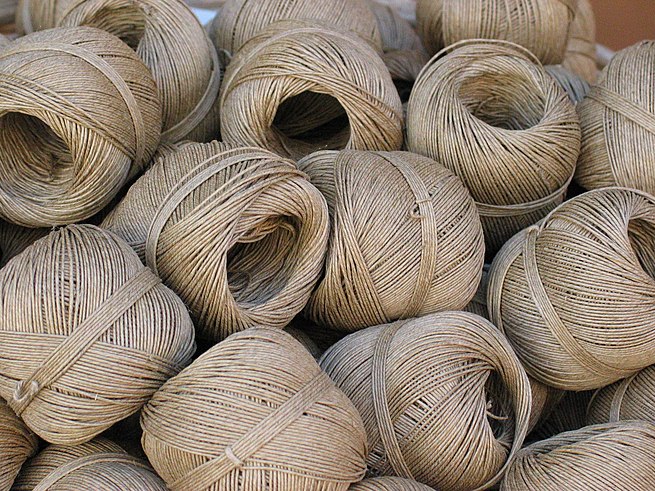
-
Twine
Twine is a light string or strong thread composed of two or more smaller strands or yarns twisted, and then twisted together. More generally, the term can be applied to a cord.
Natural fibres used for making twine include, wool, cotton, sisal, jute, hemp, henequen, and coir. A variety of synthetic fibres are also used.
-
Twine (noun)
A twist; a convolution.
-
Twine (noun)
A strong thread composed of two or three smaller threads or strands twisted together, and used for various purposes, as for binding small parcels, making nets, and the like; a small cord or string.
-
Twine (noun)
The act of twining or winding round.
-
Twine (noun)
Intimate and suggestive dance gyrations.
“1965, Wilson Pickett, Don’t Fight It (blues song), BMI Music.”
-
Twine (verb)
To weave together.
-
Twine (verb)
To wind, as one thread around another, or as any flexible substance around another body.
-
Twine (verb)
To wind about; to embrace; to entwine.
-
Twine (verb)
To mutually twist together; to become mutually involved; to intertwine.
-
Twine (verb)
To wind; to bend; to make turns; to meander.
-
Twine (verb)
To ascend in spiral lines about a support; to climb spirally.
“Many plants twine.”
-
Twine (verb)
To turn round; to revolve.
-
Twine (verb)
To change the direction of.
-
Twine (verb)
To mingle; to mix.
-
String (noun)
A long, thin and flexible structure made from threads twisted together.
-
String (noun)
Such a structure considered as a substance.
-
String (noun)
Any similar long, thin and flexible object.
“a violin string”
“a bowstring”
-
String (noun)
A thread or cord on which a number of objects or parts are strung or arranged in close and orderly succession; hence, a line or series of things arranged on a thread, or as if so arranged.
“a string of shells or beads; a string of sausages”
-
String (noun)
A cohesive substance taking the form of a string.
“The string of spittle dangling from his chin was most unattractive”
-
String (noun)
A series of items or events.
“a string of successes”
-
String (noun)
The members of a sports team or squad regarded as most likely to achieve success. (Perhaps metaphorical as the “strings” that hold the squad together.) Often first string, second string etc.
-
String (noun)
In various games and competitions, a certain number of turns at play, of rounds, etc.
-
String (noun)
A group of racehorses kept at one track.
-
String (noun)
An ordered sequence of text characters stored consecutively in memory and capable of being processed as a single entity.
-
String (noun)
A stringed instrument.
-
String (noun)
The stringed instruments as a section of an orchestra, especially those played by a bow, or the persons playing those instruments.
-
String (noun)
The conditions and limitations in a contract collectively.
“no strings attached”
-
String (noun)
The main object of study in string theory, a branch of theoretical physics.
-
String (noun)
Cannabis or marijuana.
-
String (noun)
Part of the game of billiards, where the order of the play is determined by testing who can get a ball closest to the bottom rail by shooting it onto the end rail.
-
String (noun)
The points made in a game of billiards.
-
String (noun)
The line from behind and over which the cue ball must be played after being out of play, as by being pocketed or knocked off the table; also called the string line.
-
String (noun)
A strip, as of leather, by which the covers of a book are held together.
-
String (noun)
A fibre, as of a plant; a little fibrous root.
-
String (noun)
A nerve or tendon of an animal body.
-
String (noun)
An inside range of ceiling planks, corresponding to the sheer strake on the outside and bolted to it.
-
String (noun)
The tough fibrous substance that unites the valves of the pericarp of leguminous plants.
“the strings of beans”
-
String (noun)
A small, filamentous ramification of a metallic vein.
-
String (noun)
A stringcourse.
-
String (noun)
A hoax; a fake story.
-
String (verb)
To put (items) on a string.
“You can string these beads on to this cord to make a colorful necklace.”
-
String (verb)
To put strings on (something).
“It is difficult to string a tennis racket properly.”
-
String (verb)
To form into a string or strings, as a substance which is stretched, or people who are moving along, etc.
-
Twine (noun)
strong thread or string consisting of two or more strands of hemp or cotton twisted together.
-
Twine (noun)
an instance of moaning or complaining
“having a good twine today—well, I am British and we do love complaining!”
-
Twine (verb)
wind or cause to wind round something
“she twined her arms round his neck”
“the plant will twine round its support”
-
Twine (verb)
interlace
“a spray of jasmine was twined in her hair”
-
Twine (verb)
moan; complain
“stop twining on about the snow”
“Sorry—I don’t mean to moan at you. I’ve twined about it enough over the years”
